#p-m
Explore tagged Tumblr posts
Text
✨Weekly Progress #24✨
Playing Ace Attorney might be what's keeping me sane nowadays
Because if I get back into shiny hunting, I will most definitely not be sane.
sketched & colored 6 P-M end cards
Wrote 130 words for SFB
Posted devlogs
Thumbnailed P-M epilogue
Thumbnailed SFB art
Answered BWBOK comments
Sketched 3 SFB animations + 1 CG
Made SFB demo marketing plan
Made SFB Logo
Finished SFB Animation 4
Reviewed BWBOK comments
Lined SFB Animation 3
Lined + Flat colored SFB Animation 2
Almost done with SFB CG lineart
Wrote 1k+ words for BWBOK

A Sky of Falling Birds
You all have spoiled me with the attention you've given SYVNH, I've forgotten how important it is to start marketing the moment a jam starts. Luckily Arimia has instilled the basics into everyone in the server so I had some ideas to fall back to. It's pretty squished and I've still got a lot of work to do.
Since I originally penned the script for SFB, I had the bold idea to do some animation. It was intended to be cinematic and test my skills in animating. Well, that was before I made deadlines for myself and before considering commercialization of... any of my work.
So for what I planned to show off in the demo, I had to go back and reconsider some of the fight scenes, which I wanted to animate. I'll focus more on renpy based animations. Still simple, but hopefully still cinematic enough to entertain.
The demo is currently planned for 4 short animations like this and 2 CGs, with 2k words. I think the only things I'm testing right now is my speed, sanity, and stamina.



Pre-Make
Will this tiny game ever be finished? It's time to take a break again to meet deadlines on other projects.

The art is almost completely done now. I just have the most difficult one left... drawing a Victorian town square that'll only be used for one scene.
The Beauty Which Only Beast Knows
Initial editing has finished so I'm back to work making corrections and additions to the script!
Other

I mark down all my dev tasks each week, it's how I can make all these devlogs. This is probably only the second time ever where 2 weeks worth of tasks filled an entire page. Usually I only manage half a page or a three-quarters of a page.
4 notes
·
View notes
Text
Play Space/Mech/Pilot right now

44K notes
·
View notes
Text

Catherynne M. Valente, from The Bread We Eat in Dreams; "The Red Girl," published in 2013
#lit#catherynne m. valente#prose#the red girl#fragments#typography#dark academia#writings#selections#fragment#quote#p
3K notes
·
View notes
Text
The one weird monopoly trick that gave us Walmart and Amazon and killed Main Street
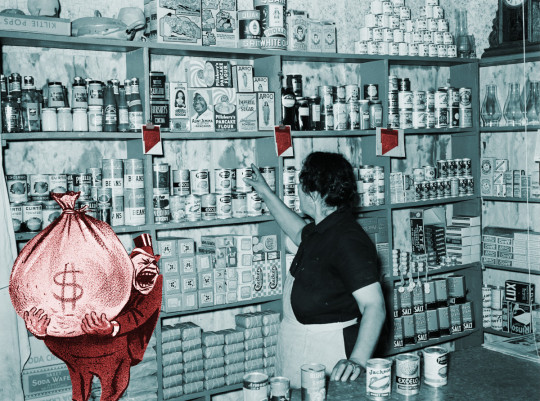
I'm coming to BURNING MAN! On TUESDAY (Aug 27) at 1PM, I'm giving a talk called "DISENSHITTIFY OR DIE!" at PALENQUE NORTE (7&E). On WEDNESDAY (Aug 28) at NOON, I'm doing a "Talking Caterpillar" Q&A at LIMINAL LABS (830&C).

Walmart didn't just happen. The rise of Walmart – and Amazon, its online successor – was the result of a specific policy choice, the decision by the Reagan administration not to enforce a key antitrust law. Walmart may have been founded by Sam Walton, but its success (and the demise of the American Main Street) are down to Reaganomics.
The law that Reagan neutered? The Robinson-Patman Act, a very boring-sounding law that makes it illegal for powerful companies (like Walmart) to demand preferential pricing from their suppliers (farmers, packaged goods makers, meat producers, etc). The idea here is straightforward. A company like Walmart is a powerful buyer (a "monopsonist" – compare with "monopolist," a powerful seller). That means that they can demand deep discounts from suppliers. Smaller stores – the mom and pop store on your Main Street – don't have the clout to demand those discounts. Worse, because those buyers are weak, the sellers – packaged goods companies, agribusiness cartels, Big Meat – can actually charge them more to make up for the losses they're taking in selling below cost to Walmart.
Reagan ordered his antitrust cops to stop enforcing Robinson-Patman, which was a huge giveaway to big business. Of course, that's not how Reagan framed it: He called Robinson-Patman a declaration of "war on low prices," because it prevented big companies from using their buying power to squeeze huge discounts. Reagan's court sorcerers/economists asserted that if Walmart could get goods at lower prices, they would sell goods at lower prices.
Which was true…up to a point. Because preferential discounting (offering better discounts to bigger customers) creates a structural advantage over smaller businesses, it meant that big box stores would eventually eliminate virtually all of their smaller competitors. That's exactly what happened: downtowns withered, suburban big boxes grew. Spending that would have formerly stayed in the community was whisked away to corporate headquarters. These corporate HQs were inevitably located in "onshore-offshore" tax haven states, meaning they were barely taxed at the state level. That left plenty of money in these big companies' coffers to spend on funny accountants who'd help them avoid federal taxes, too. That's another structural advantage the big box stores had over the mom-and-pops: not only did they get their inventory at below-cost discounts, they didn't have to pay tax on the profits, either.
MBA programs actually teach this as a strategy to pursue: they usually refer to Amazon's "flywheel" where lower prices bring in more customers which allows them to demand even lower prices:
https://www.youtube.com/watch?v=BaSwWYemLek
You might have heard about rural and inner-city "food deserts," where all the independent grocery stores have shuttered, leaving behind nothing but dollar stores? These are the direct product of the decision not to enforce Robinson-Patman. Dollar stores target working class neighborhoods with functional, beloved local grocers. They open multiple dollar stores nearby (nearly all the dollar stores you see are owned by one of two conglomerates, no matter what the sign over the door says). They price goods below cost and pay for high levels of staffing, draining business off the community grocery store until it collapses. Then, all the dollar stores except one close and the remaining store fires most of its staff (working at a dollar store is incredibly dangerous, thanks to low staffing levels that make them easy targets for armed robbers). Then, they jack up prices, selling goods in "cheater" sizes that are smaller than the normal retail packaging, and which are only made available to large dollar store conglomerates:
https://pluralistic.net/2023/03/27/walmarts-jackals/#cheater-sizes
Writing in The American Prospect, Max M Miller and Bryce Tuttle1 – a current and a former staffer for FTC Commissioner Alvaro Bedoya – write about the long shadow cast by Reagan's decision to put Robinson-Patman in mothballs:
https://prospect.org/economy/2024-08-13-stopping-excessive-market-power-monopoly/
They tell the story of Robinson-Patman's origins in 1936, when A&P was using preferential discounts to destroy the independent grocery sector and endanger the American food system. A&P didn't just demand preferential discounts from its suppliers; it also charged them a fortune to be displayed on its shelves, an early version of Amazon's $38b/year payola system:
https://pluralistic.net/2022/11/28/enshittification/#relentless-payola
They point out that Robinson-Patman didn't really need to be enacted; America already had an antitrust law that banned this conduct: section 2 of the the Clayton Act, which was passed in 1914. But for decades, the US courts refused to interpret the Clayton Act according to its plain meaning, with judges tying themselves in knots to insist that the law couldn't possibly mean what it said. Robinson-Patman was one of a series of antitrust laws that Congress passed in a bid to explain in words so small even federal judges could understand them that the purpose of American antitrust law was to keep corporations weak:
https://pluralistic.net/2023/04/14/aiming-at-dollars/#not-men
Both the Clayton Act and Robinson-Patman reject the argument that it's OK to let monopolies form and come to dominate critical sectors of the American economy based on the theoretical possibility that this will lead to lower prices. They reject this idea first as a legal matter. We don't let giant corporations victimize small businesses and their suppliers just because that might help someone else.
Beyond this, there's the realpolitik of monopoly. Yes, companies could pass lower costs on to customers, but will they? Look at Amazon: the company takes $0.45-$0.51 out of every dollar that its sellers earn, and requires them to offer their lowest price on Amazon. No one has a 45-51% margin, so every seller jacks up their prices on Amazon, but you don't notice it, because Amazon forces them to jack up prices everywhere else:
https://pluralistic.net/2024/03/01/managerial-discretion/#junk-fees
The Robinson-Patman Act did important work, and its absence led to many of the horribles we're living through today. This week on his Peoples & Things podcast, Lee Vinsel talked with Benjamin Waterhouse about his new book, One Day I���ll Work for Myself: The Dream and Delusion That Conquered America:
https://athenaeum.vt.domains/peoplesandthings/2024/08/12/78-benjamin-c-waterhouse-on-one-day-ill-work-for-myself-the-dream-and-delusion-that-conquered-america/
Towards the end of the discussion, Vinsel and Waterhouse turn to Robinson-Patman, its author, Wright Patman, and the politics of small business in America. They point out – correctly – that Wright Patman was something of a creep, a "Dixiecrat" (southern Democrat) who was either an ideological segregationist or someone who didn't mind supporting segregation irrespective of his beliefs.
That's a valid critique of Wright Patman, but it's got little bearing on the substance and history of the law that bears his name, the Robinson-Patman Act. Vinsel and Waterhouse get into that as well, and while they made some good points that I wholeheartedly agreed with, I fiercely disagree with the conclusion they drew from these points.
Vinsel and Waterhouse point out (again, correctly) that small businesses have a long history of supporting reactionary causes and attacking workers' rights – associations of small businesses, small women-owned business, and small minority-owned businesses were all in on opposition to minimum wages and other key labor causes.
But while this is all true, that doesn't make Robinson-Patman a reactionary law, or bad for workers. The point of protecting small businesses from the predatory practices of large firms is to maintain an American economy where business can't trump workers or government. Large companies are literally ungovernable: they have gigantic war-chests they can spend lobbying governments and corrupting the political process, and concentrated sectors find it comparatively easy to come together to decide on a single lobbying position and then make it reality.
As Vinsel and Waterhouse discuss, US big business has traditionally hated small business. They recount a notorious and telling anaecdote about the editor of the Chamber of Commerce magazine asking his boss if he could include coverage of small businesses, given the many small business owners who belonged to the Chamber, only to be told, "Over my dead body." Why did – why does – big business hate small business so much? Because small businesses wreck the game. If they are included in hearings, notices of inquiry, or just given a vote on what the Chamber of Commerce will lobby for with their membership dollars, they will ask for things that break with the big business lobbying consensus.
That's why we should like small business. Not because small business owners are incapable of being petty tyrants, but because whatever else, they will be petty. They won't be able to hire million-dollar-a-month union-busting law-firms, they won't be able to bribe Congress to pass favorable laws, they can't capture their regulators with juicy offers of sweet jobs after their government service ends.
Vinsel and Waterhouse point out that many large firms emerged during the era in which Robinson-Patman was in force, but that misunderstands the purpose of Robinson-Patman: it wasn't designed to prevent any large businesses from emerging. There are some capital-intensive sectors (say, chip fabrication) where the minimum size for doing anything is pretty damned big.
As Miller and Tuttle write:
The goal of RPA was not to create a permanent Jeffersonian agrarian republic of exclusively small businesses. It was to preserve a diverse economy of big and small businesses. Congress recognized that the needs of communities and people—whether in their role as consumers, business owners, or workers—are varied and diverse. A handful of large chains would never be able to meet all those needs in every community, especially if they are granted pricing power.
The fight against monopoly is only secondarily a fight between small businesses and giant ones. It's foundationally a fight about whether corporations should have so much power that they are too big to fail, too big to jail, and too big to care.

Community voting for SXSW is live! If you wanna hear RIDA QADRI and me talk about how GIG WORKERS can DISENSHITTIFY their jobs with INTEROPERABILITY, VOTE FOR THIS ONE!

If you'd like an essay-formatted version of this post to read or share, here's a link to it on pluralistic.net, my surveillance-free, ad-free, tracker-free blog:
https://pluralistic.net/2024/08/14/the-price-is-wright/#enforcement-priorities
#pluralistic#Robinson-Patman Act#ftc#alvaro bedoya#monopoly#monopsony#main street#too big to jail#too big to care#impunity#regulatory capture#prices#the american prospect#Max M Miller#Bryce Tuttle#a and p#wright patman
2K notes
·
View notes
Text

my guy, what are you talking about, those are your legal names
#you can immediately tell which one’s which well yes they have your names darling as well as your bedsheets that you had for years#i think he wants to be super chatty in m&gs probably? so he will just say anything and not think about it but#he’s so funny#my guy is just yapping#dnp#dan and phil#phan#phil lester#dan howell#daniel howell#d&p#dnp tit#dip and pip#amazingphil#dnptit
2K notes
·
View notes
Text




Miguel is the plan guy in this triad (however useless it is with a chaos incarnate in it) and he'll make sure of it one bad fashion statement at a time.
#logan howlett#wade wilson#miguel o'hara#wolverine#deadpool#spiderman 2099#poolverine#deadfang#i still am in denial and refuse to name this ship :P#deadpool and wolverine#spiderverse#i had so much fun thinking up the dumbest futurey clothes#not very creative that ones but they send the message#and please appreciate all the backgrounds of wtf bar goers and random gizmos in lab I did#I;m so proud of myself to spend so much time on a silly comic :3#but hey the ship is progressing nicely :3#logan and migs can bond on being annoying
1K notes
·
View notes
Text

Miss Oranje Disco Dancer
#c o m p r o m i s e d#disco elysium#klaasje amandou#klaasje#discodancer#disco#dancer#digital art#fanart#my art
3K notes
·
View notes
Text

PARIS, FRANCE - AUGUST 05: Gold medalist Armand Duplantis of Sweden sets a new world record during the Men's Pole Vault Final on day ten of the Olympic Games Paris 2024 at Stade de France on August 05, 2024 in Paris, France. Photo by Adam Pretty.
1K notes
·
View notes
Text




i'd say i'm sorry for this but i'd be lying
1K notes
·
View notes
Text
keep seeing people who clearly think meaningful pro-palestine activism is harassing anyone online who is not constantly saying the exact words they want to see. like tell me why people are harassing adam conover for "ignoring what's going on" and when he posted a video about how he literally made an entire podcast episode about it. they go "ummm but why haven't you said #FreePalestine yet :/" and getting mad he said he isn't posting clips because it's too nuanced a topic to reduce to a single snippet. which besides all that. it's one of the biggest issues in the news right now i do not think you need adam conover to be posting the same links and information that are being posted everywhere on leftist social media? he is a singular guy whose social media presence is very focused on (American) labor struggles atm. why are y'all like this
4K notes
·
View notes
Text
✨Weekly Progress #32-33✨
buckle up cause I actually did a lot the past two weeks lmao
Weekly Progress #32
Came up with mushroom jam rpg idea
Initial ID rest of SYVNH work
Thumbnail 10 SYVNH BGs
Designed new SYVNH sprites
Updated P-M expressions
Spooktober discussions
New list of P-M work to do
Thumbnailed 15 SYVNH CGs
Made VF jam outline
Finished VF jam script
Found music and sound effects for VF Jam
Attended Spooktober meet and greet
Thumbnailed VF art
Sketched VF sprites design
Fin 1 VF sprite
omg where do I start...
I'm not planning to join Mushroom Jam wait, it's like 3 months long?? I just might... but I had a mini-idea where I can test out Wolf RPG Engine so I might as well write down the idea and potentially make it--... I'm joining this jam in a couple months, aren't I? (derp) So far, I just have the concept idea in. I'll have to learn how to make what I want to do first. It'll just be a simple puzzle game.
All the remaining SYVNH pre-work has been done! Now to do the actual work...
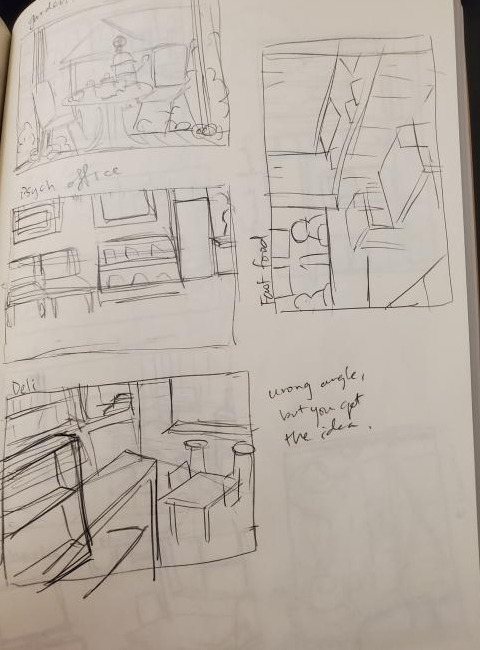
I sped drew 10 BGs and 15CG thumbnails during lunch at work. Don't ask what happened with the Deli there. I had an image in mind, but the space started looking empty and then the angle got twisted to the top. I'll fix it when I start drawing digitally.
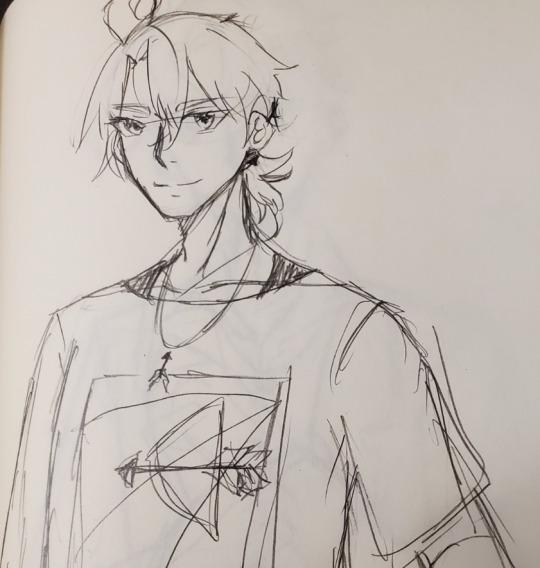

And some new sprite designs! :) ...That is all I'll say for now. Save the surprise for the full game. Or when I run out of advertising ideas at the end of the year.
P-M is short for a short game I've been working on and off (mostly off) since 2020. The full name will be Pre-Make. All the major work has been finished, but it got pushed to the side for a long time. The gameplay for P-M is actually the original test run for the gameplay I planned for SYVNH.
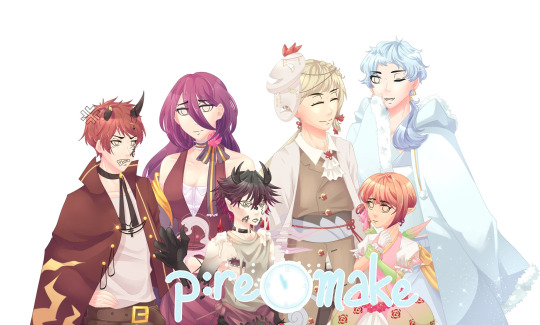
(The last update was 2021... I think that predates this blog...?!)
Hmm... My coloring style was pretty different back then...
And then, towards the end of the week, I found Velox Fabula jam. After a few hours of lamenting with other members of the devclub... I came up with a short idea for the game. I'll probably be writing a post mortem next week to better explain the thought process behind the game, but here are some concept art for the game :)


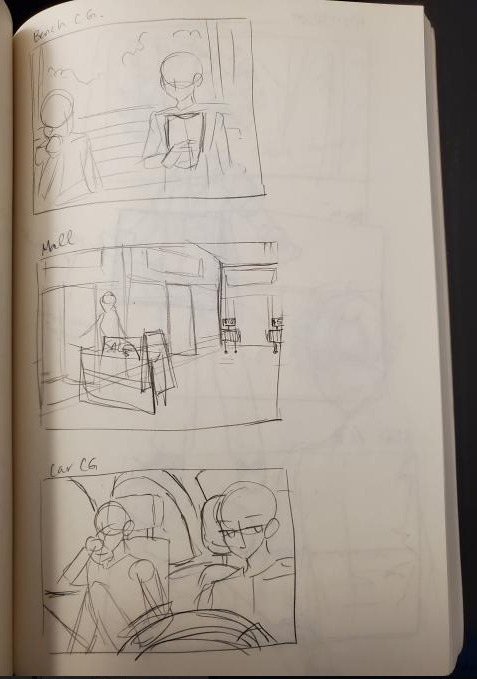
Weekly Progress #33
Finished VF sprites, BGs, CGs
Coded VF game
Finished VF gamepage
Found mushrooms I want to draw for mushroom jam
I squished it all together, but there were two sprites, 3 BGs, and 3 CGs finished from scratch this week.
You can play my entry, one last time. in browser here!
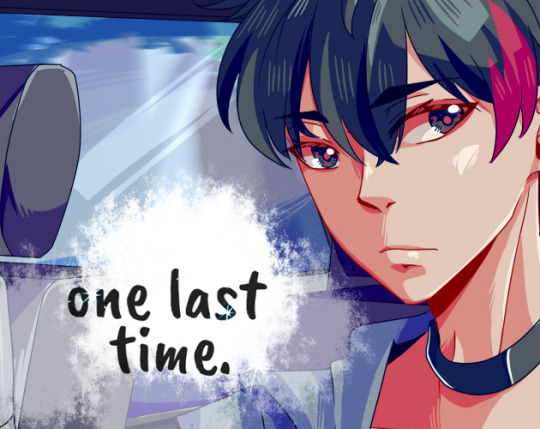
#vnlink#visual novel#indie dev#vndev#syvnh#p-m#olt#mushroom jam project#someday I'll fix all the tags#but not today#thanks for reading!
6 notes
·
View notes
Text

#jiraiblr#landmineblr#jiraiblogging#landmineblogging#jirai#p#jirai kei#jirai danshi#jirai boy#dark girly kei#dark girly#girly kei#jfashion#menhera#menhera kei#landmine boy#landmine type#landmine kei#jirai subcul#subcul jirai#yami kawaii#yamikawaii#ryousangata#m
713 notes
·
View notes
Text
ghost training the rookies 👻 (🌽 link) -male reader-
training newbies, although not the most exciting thing, is part of his job description. every once in a while he welcomes a fresh batch of rookies who are outright rude and disrespectful -definitely mouthy-, nothing he can't handle.
but when these rookies can't seem to understand discipline, he begins to grow tired and starts losing his patience. and you, one of those newcomers, happened to say the wrong thing at the wrong time, and the lieutenant hears. and he's not happy. by punishing you, he aims to teach you a lesson and set an example for the rest of the troop.
however, this isn't your typical punishment - by now ghost knows those methods don't work -. he orders you to lie on your back and open your mouth wide, giving him easy access to your throat so he can use your throat and teach you some manners.
at first, that big cock of his making you gag just from the sheer size when he slides in. when you think you've finally somewhat gotten used to the feeling, ghost suddenly starts to fuck your throat relentlessly - his balls hitting your face with each thust and him cooing at you, telling you how much of a bad boy you've been, asking you if you finally understood who's in charge.
what ghost didn't expect was for you to keep misbehaving on purpose, just to get his cock ;)
thanks to @ghostsandguns and @nox-swansea for beta reading this ♡ -specially @ghostsandguns for fully checking it -
#cod#cod smut#cod x reader#cod headcanons#cod x y/n#cod x you#p!link#ghost smut#cod ghost#simon ghost riley#ghost cod#ghost#simon ghost x reader#ghost x y/n#ghost x you#ghost x reader#simon riley x reader#ghost simon riley#simon riley#ghost x male reader#simon riley x you#simon riley smut#cod simon riley#simon riley x male reader#male reader#m reader#mlm#mlm nsft
736 notes
·
View notes
Text
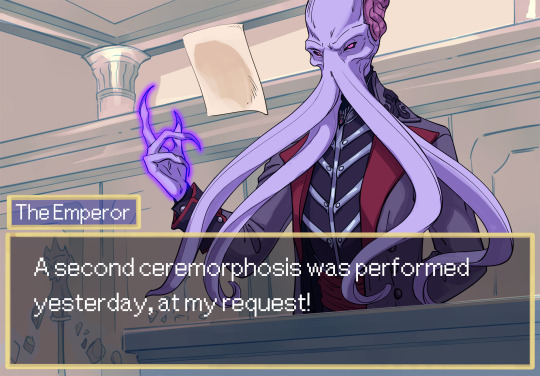
Empy you CAN'T just keep ceremorphing the witnesses
#i'm so sorry this is dumb af#I just wanted to draw him as a hot evil prosecutor#he would yell something sexy as his 2nd interjection like#“I M P E R M I S S A B L E”#ace attorney#bg3 emperor#emperor bg3#bg3#my art
611 notes
·
View notes
Text
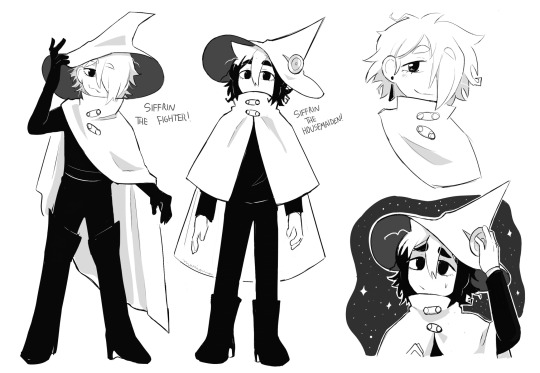
obsessed with @anxiousapplepie role swap au, so have a quick fighter and housemaiden siffrin!
#the fighter is fabulous muah muah what a fun little enby#i only have one line of info on housemaiden siffrin. absolutely no info on his face (I bet the black eyebrows are incorrect. rip...)#BUT I ALREADY LOVE THEM DEARLY THE COMCEPT!! THE DESIGN!!! IT C O M P E L S M E#isat#isat au#isat siffrin#mari draws#in stars and time#i was going to ask about the eyebrow shade but after my 'is it a glove or a spandex?' ask i went 'i will free style' hope is alright
488 notes
·
View notes